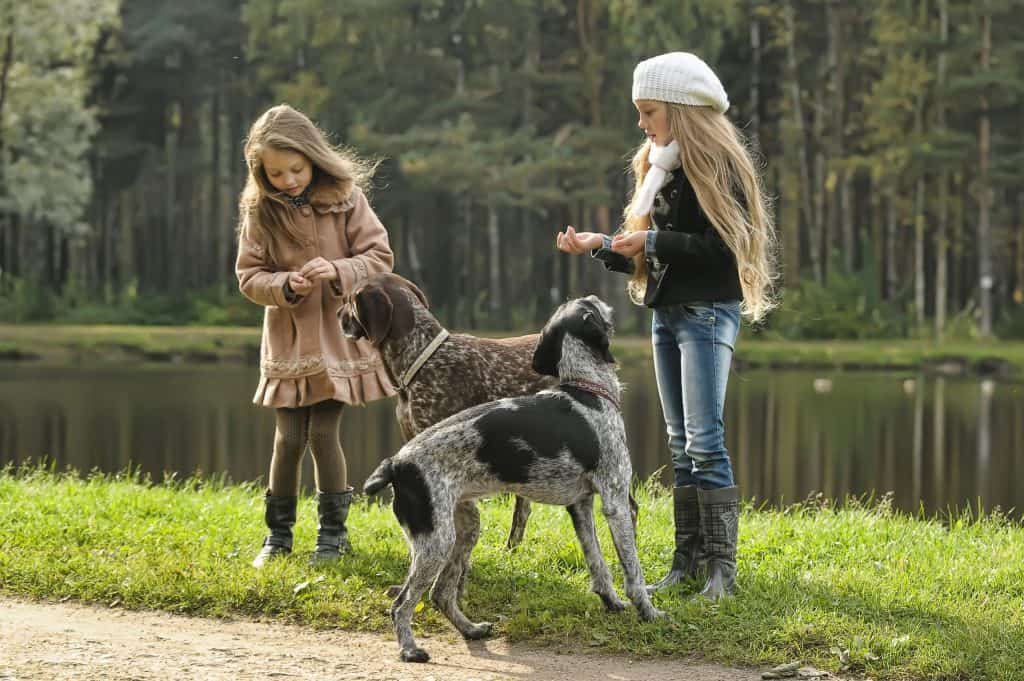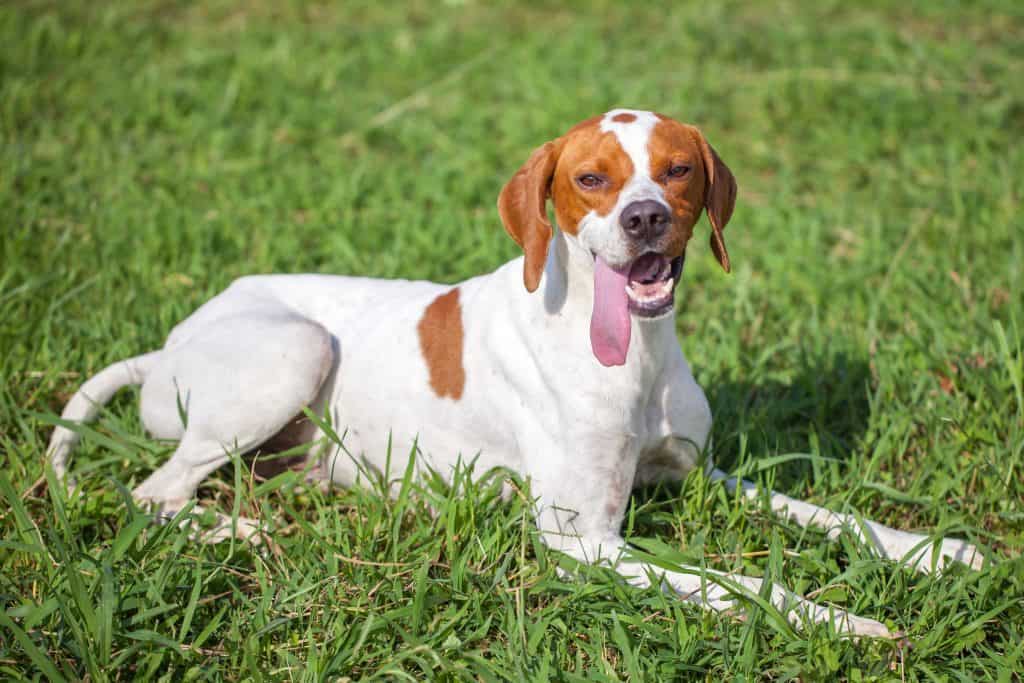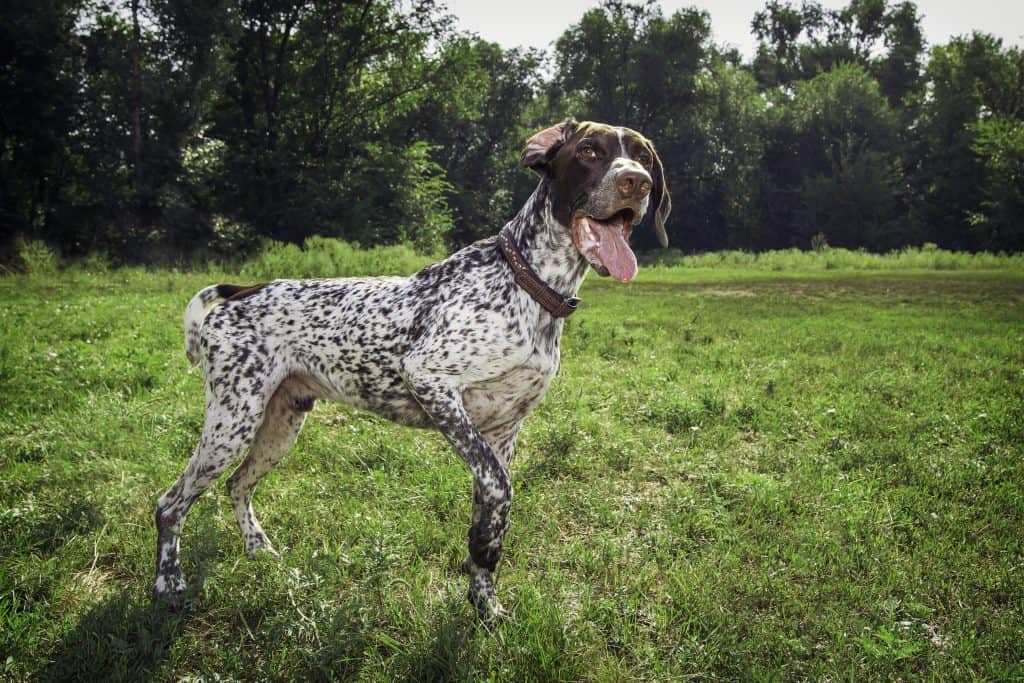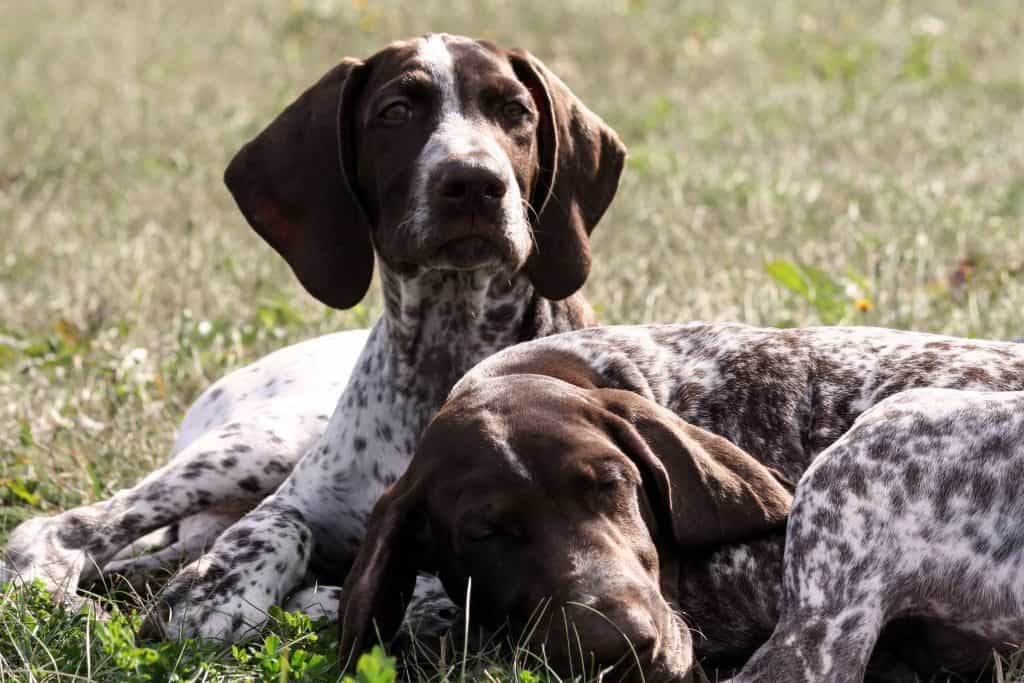Are Pointers Good with Kids? A Guide for Parents.

It’s true that pointers are bred for the hunt, but you have to wonder if they are also good enough with kids to be considered a viable “family” pet. Parents constantly worry about the safety of their children around dogs, so it’s important to know what each breed brings to the table.
Pointers are good with older kids that aren’t easily knocked over. They love the family and want to play; however, pointers are strong and have a lot of natural energy which means they can knock over small children without meaning to.
Pointers are generally good natured and like to be included in the family. There are definitely some positives and negatives when it comes to pointers and kids; however, there are plenty of ways to make a pointer better suited for a home with kids.
Pointers and Kids
Pointers, like all of us, just want to be loved! They want nothing more than to be around their family (besides, perhaps, a nice bird to chase).
Pointers are very good with kids. They are not bothered by rough play or small hands pulling at them. They are generally very gentle and won’t mind kids climbing on them.
In a blog discussing the best family dogs for kids, Holle Abee tells the story of her pointer, Herman, and toddler, Mandy, and makes this comment:
“Mandy would often climb all over Herman, and he never got the least bit perturbed. In fact, he seemed to love the attention. The other pointers we’ve had were the same way with kids, too. “
Pethelpful.com
Pointers don’t mind being touched and crave the attention that kids are so willing to give. Their gentle nature makes it easier for them to be around rough and rowdy children.
They are muscular creatures and can handle a small child climbing on them; however, you don’t want to always assume that the dog is okay with this. You will want to monitor how your dog is reacting to it; sometimes he/she may need a break from the relentless needs of a toddler.
Raising Pointers and Kids Together
It’s a very popular notion to get a puppy while your kids are young so that they have the chance to grow up together. This is actually a good idea with pointers because it will help them learn how to interact, be comfortable with, and respect kids.
A word of caution would be to take time to determine when the right age is to get a pointer puppy for your child.
It is not recommended to have a pointer under the age of two in the same house as an infant or toddler because these dogs grow strong quickly. When you combine strength with their endless supplies of energy, you’ve got some trouble on your hands.
Pointers are notorious for knocking over small children when they’re young because they get so excited and don’t have much control over their flailing body and tail.
To learn more about having pointer puppies around children, you can read my other article here on emborapets.
Pointers require a lot of time, energy, and training in the early stages of (and throughout) their lives. It may be a better option to wait until your children are done toddling to introduce a new pointer puppy.
This way, your kids can learn how to interact with and handle the dog just as much as the puppy can learn the same things for you and your children. Your kids can help in the training and bond with their new pointer as it learns and grows.
When your child is around 5 or 6 years old, they will be significantly more stable, and a rambunctious puppy won’t cause as much concern for parents.
“Man’s best friend” is no understatement about how close a pointer can become to your family — especially your kids.

In general, many people see a masterful hunting companion when they look at the pointer. This reputation requires endurance, agility, intelligence, alertness, discipline, and training.
What people don’t recognize about the pointer right away is the other attributes that make them perfect dogs for active families. Pointers are also:
- affectionate
- loyal
- gentle
- lighthearted
- lively
- sweet-natured
- congenial
- energetic
Pointers have an abundance of great qualities that are good for families with children.
They are, as has been discussed, extremely energetic and can be great playmates for your children. They will happily run, fetch, and play for hours on end.
This is good news for some parents when they can send the dog and kid outside to burn off some energy together! “Killing two birds with one stone”, as they say.
Another important attribute to know about pointers is their general neediness in the best and worst ways.
Needy in the Best Ways
Pointers crave affection and attention. They want to cuddle with you on the couch and lay with your kids as they play.
Pointers also love being pet and scratched. Kids are great for that because children are sometimes just as needy; they love to pet and mess with dogs and the pointer will eat up this attention.
We all want a pet that wants to be around us. They are always ready to chill out after a long day if they’ve been given an outlet for their exuberance. They will follow you around and nudge your hands hoping for a scratch behind the ears.
Their neediness can be extremely endearing, but sometimes it is a little taxing.
Needy in the Worst Ways
Pointers require a strict exercise regime. They will be hyperactive and destructive when they don’t get the physical and mental stimulation that they need.
Kids can help counteract this a lot of the time by running around with them outside and throwing a ball or frisbee with them; however, this is not sufficient all the time. Pointers need vigorous exercise and a casual afternoon in the backyard is not always enough.
You’ll need to dedicate a lot of time and energy taking them on runs or out to a large area they can explore for a while. A backyard isn’t a big enough space for a pointer to burn off energy.
A lot of owners will take them to a large field where they can roam around, follow scents, and play. Away from the busy streets of suburban life is good when they want to roam around safely.
Other families will take their pointer on runs or bike rides. This allows them to exercise while their dog does. All in all, you have to find the best solution that works with you, your family, and your dog.
It takes a lot of effort and time, but a pointer is definitely worth the trouble if you are willing to try.
Adult Pointers and Kids
If you already have a pointer and are having kids, or if you are planning to integrate an adult pointer into your kid-friendly household, then your question may be entirely different.
Pointers are good natured and naturally have affection for people in general. Depending on their background (if they were ever abused in a previous home) and individual personality, you will just want to gauge their attitude towards children and introduce them into the household slowly.
A well-trained pointer will typically have little to no problems integrating into a household with children. You always want to monitor the dog’s behavior and interactions with your children, but you’ll know quickly how they get along.
Two years old is the age that pointers become more adept at being around kids.
If you have an older dog already, there is no need to worry too much as long as they’re well trained. They will quickly learn the do’s and don’t’s that exist around children, and they will be curious and excited about the new addition to the family.
Pointers and Infants/Toddlers
Most people do not advise pointers for families with infants or toddlers. Pointers, especially under two years old, have high energy levels and strong, muscled bodies they don’t always keep under control.
They don’t mean any harm, but they get so excited that they will run and jump around knocking anything over in his/her path. A wagging tail can also be the catalyst for a toppled child.

You will want to supervise all interactions between your pointer and toddler/infant just to make sure nothing goes wrong. A misplaced paw or rare moment of feeling threatened can result in some injury or fear.
This is true with any animal, so it’s important to keep an eye on young children and the dog.
Pointers are very gentle creatures, but you should always be aware of what’s going on. It’s just the reality of dog ownership that sometimes things go wrong.
They knock things over, nip at you or your children, dig up the backyard, rip toilet paper to shreds, and other mischievous or naughty behaviors.
Training goes a long way to help redirect that behavior and teach right and wrong along with the consequences of each to a dog.
Pointers are very susceptible to training and are eager to learn. They are sometimes stubborn and it may take a while for them to really get it, but they will definitely get there!
Training takes time and a lot of patience. Another reason it’s hard to have a puppy and baby at the same time is that you can’t give the pointer the attention or time that it needs to get trained.
Figure out what’s best for you and your kids. A puppy is a good practice for an older child learning responsibility but isn’t so good for a needy infant or toddler learning how to walk or sleep through the night.
Pointers are Family Dogs
Pointers love to be outdoors, but they also really want to be indoors where the family is. When given the right amount of exercise and stimulation, pointers are calm and great house pets.
They are not aggressive and are very versatile pets. Pointers are triple threat pets: they can be calm household companions, energetic and happy playmates, and dedicated hunting companions.
Every one of these is made easier and possible through the consistent training done by the owners. It’s important to remember that pointers can be anything you want them to be (within reason) if you’re willing to train them.
Pointers will consider themselves another member of your family very quickly. They love to be around you and spend time with you and the kids. They want to play and run but then come home at the end of the day and sleep inside.
They are very good family dogs as long as they receive the exercise and stimulation that they need. If you take the time every day to exercise them and allow them to burn off their ample supply of energy then they are calm and content in a house setting.
The trouble comes when they’re not given those outlets and they become destructive and difficult to handle.
Pointers were bred to be hunting dogs that stayed outside all day running around and tracking prey. Just because they aren’t being used for hunting in your home does not mean that those tendencies and needs will just go away.
They need to go outside play, exercise, and train to really be the best they can be. Some people mistake this for them needing to run the energy out of them, but Pointers also need mental stimulation to be happy.
They are very intelligent creatures and a game of fetch or other games that gets them thinking and problem-solving will go a long way in making your pointer a better dog and family companion.
A pointer will just as soon cuddle up with you on the couch as they would chase a thrown tennis ball. They so desperately want to be with you, soaking up all your attention and love, but they need those most basic outlets throughout the day to allow them the calmness and peace of mind to exist in a happy home setting.

Pointers can be very good watchdogs. They are not very adept protective or “attack dogs”; however, they can certainly alert you and your family to strange noises or things happening around your house.
They were born with sharp senses. They were bred to listen for and track birds and small prey by scent. They are hyper-aware of the things that go on around them.
Teaching Kids About Pointers
A lot of kids naturally love dogs and gravitate towards them. They love to hug them and play with them and get in their faces. It depends greatly on the breed, temperament, and individual personality of the dogs whether or not they will be okay with that.
No matter what breed of dog you have, or whether you have a dog at all, it’s important to teach your children how to approach, react, and interact with dogs early on.
The best way is to actually have a dog in your home. Pointers are very good teaching tools for your children because they are a great blend of energy and good-naturedness.
Your pointer is going to be happy to see your children and will quickly get used to them coming up and touching them. Other dogs may not be so well restrained and gentle.
No matter how your dog interacts with your kids, you want to make sure your kids understand that not all dogs are the same.
Some simple lessons you will want your kids to keep in mind are:
- Ask permission before petting a dog that you don’t know.
- Don’t run at dogs you don’t know.
- Don’t mess with dogs while they eat.
- Watch a dogs body language and listen for growling.
There are simple lessons you can teach your children to help them respect dogs and keep themselves safe. This will certainly go a long way in making your home safer for your children and your pointer.
Learning to respect each other is key; that goes for your dog respecting your children, too.
Training Your Pointer for Kids
Pointers require a lot of training no matter what. It’s important to train them not only in general obedience but also in how to behave around and treat children as well as adults.
Pointers are generally good with kids but personality will differ depending on your individual dog and his/her background. Training is a good way to ensure that your pointer will be good around your children.
Never leave things up to chance when it comes to your dog’s reaction to other people. Consistent training will help them learn quickly what is and is not acceptable behavior.
Pointers need a structured environment to really shine and coexist happily with their people. They will learn through consistency what you allow when it comes to interacting with your kids.
If you praise them for being gentle when they are and reprimand them for doing wrong behaviors, they will quickly associate the good and bad. All lessons need to be consistent and direct. Pointers respond well to positive reinforcement, so make sure to praise them when their behavior is good.
Pointers want to be apart of your kids lives, and they can easily learn how to do that safely. Training is a key part of having a pointer as a family dog, and they are fantastic companions for you and your children.
